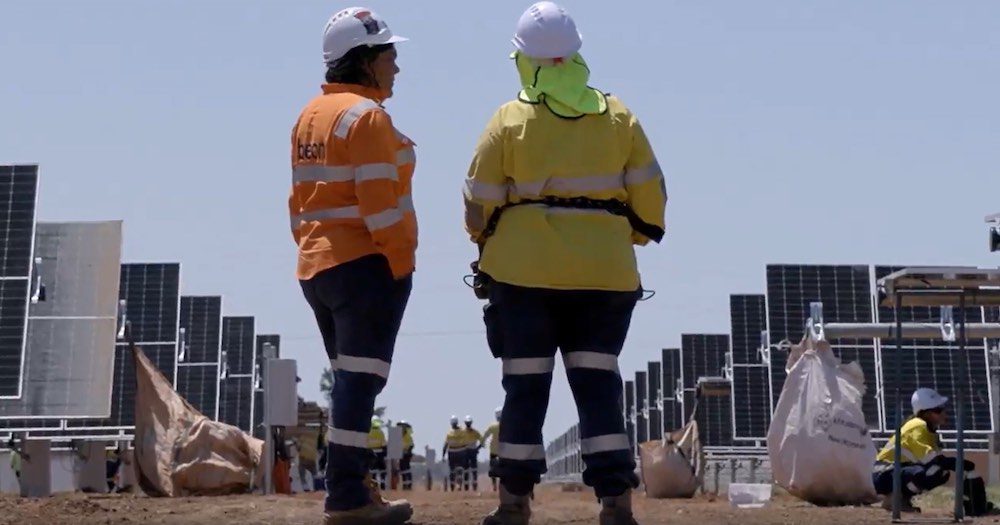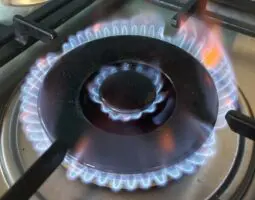The construction of a solar farm in regional New South Wales has helped bring “generational change” to a local Aboriginal community and set a new benchmark for how renewable energy developers go about the vital business of engagement and building social licence.
For the Wiradjuri people of Narrandera in regional New South Wales, who make up around 600 of the town’s total population of 2000, there is no shortage of basic needs going unmet – not least of them being employment.
But as Justin Coburn has learned as head of engagement at EPC contractor Beon Energy Solutions, you can’t just roll into towns like Narrandera and announce that there are jobs available and hope they will be filled.
You have to start with engagement: “genuine and early community engagement,” which is how he kicked things off in Narrandera when Beon was tasked with building the nearby 240MW Avonlie solar farm for developer Iberdrola.
“What we’ve learned is that it’s not just a matter of offering jobs, and saying they’re available,” Coburn told One Step Off The Grid’s Solar Insiders Podcast this week.
“A lot of these people are facing barriers to employment. So we really focus on working with them to overcome these barriers. And a key to that is employing local First Nations people.”
One of the first of these local hires was Wiradjuri and Yorta Yorta woman Shaurntae Lyons, who took up a role with Beon as a community engagement coordinator.

“Justin came … and met with our Elders first, and that’s how he actually came into the community,” Lyons told the podcast.
“He had a meeting down the Sand Hills, which is the gathering place in our community where a lot of yarning’s done, and I suppose that first initial engagement… was done that well, that our community really came on board with what was going on at Avonlie.”
Lyons says that through the success of Coburn’s first few meetings with the Indigenous community, more than 30 First Nations men and women put their hands up for jobs on the Avonlie project, some of them having never before been formally employed.
“A lot of our women, especially Aboriginal women from our community, have never been employed before – they had kids young, like me, and … had never had access to, or never had an opportunity to have employment.
“So what we did from that gathering, we set up ID days.”
ID days, Lyons says, are just how they sound: days spent at the local Tafe helping to get the necessary personal identification documents together – birth certificates, medicare cards – so that people can actually be employed.
“A lot of our mob in community don’t have identification,” Lyons said. “A lot of them, if they are on Centrelink, they’ll have a CRN number. But they don’t have birth certificates. They don’t have Medicare cards. A lot of them hadn’t had any training as well, so they needed USIs (Unique Student Identifiers).
“So I think, through our engagement, a lot of the resources that were meant to be in community that had never been used were actually being utilised now by community.”
From this process, around 30 people wound up being employed by Beon at Avonlie, in mostly labouring jobs, which Coburn says involve basically setting everything up for the installation of the solar panels – when work is handed over to qualified electricians.

“So on the mechanical side …we would have, you know, over 100 workers there, and that’s where the opportunities are, because people learn these tasks on the job. So they don’t have to have … experience, they just have to really want to have a go at doing it.
“And, you know, it’s not easy work. It’s 50-odd hours a week. …So it is a fair effort. But we had remarkable retention rates and success stories… [including] women that hadn’t worked before.
“We had one woman there who was a grandmother, this was her first job. We weren’t sure how she would go … but she was one of our best workers … who stayed right on to the end. She never missed a day,” Coburn said.
“I suppose that’s a really good example of it being a win for everybody, in that, you know, it’s not just doing the right thing… but it’s actually good for business.
“We’ve got 30 local workers who were really good workers that we otherwise wouldn’t have got and at the same time created good relationships with the local community.”

This sort of win-win result might sound pretty obvious, but as groups like RE-Alliance have been warning for years, repeated failure to meet even the most basic standards of community engagement has helped to create one of the greatest barriers to the rollout of solar, wind and transmission lines.
But as this story demonstrates, social licence is not about winning people over to the cause. It is about bringing them along on the journey – in a meaningful and empowering way. It’s about listening to what communities need and helping them to achieve it.
With the solar farm now complete, the jobs with Beon have come to an end, but Lyons – who has since got a job with Spark Renewables – says the legacy of the work that she and Coburn did with the community goes on.
“This project has brought around generational change,” she says.
“Our young people are seeing their mums and dads going to work. We’ve built self-esteem from zero to 20. The impacts for our community have been huge.”

Lyons says that as the solar farm work came to an end the community looked to what employment opportunities might come up in the future.
“We’ve got two major highways here, so … after the farm we held a traffic control course, and it set people up. We’ve also got people on the on Narrandera Shire Council – who we’ve never had a relationship with… in the past.
“But what Beon did through its engagement was kind of build a relationship – a bridge – there, where, you know, our voices were being heard from community.
“And people look at it, like only 30 [jobs]. But what we did was out of that 30 we employed, we’re actually feeding a whole community, we’re supporting a whole community off the back of 30 people, which is huge, especially in our community where there’s not any opportunities.
“We have high incarceration rates. There’s a lot of mental health in our community, because it’s not being supported by government. We’ve got health issues here that haven’t been dealt with for 20 or 30 years.
“So you may not think that these opportunities that Beon brought to our community are huge, but they are. They’re huge, and it seems to be everlasting, now.”
Lyons says that Beon also established a relationship between the community and the owner of Avonlie solar farm, Iberdrola, which – as Coburn notes – will be the company that sticks around in the community for the project’s life of around 25 years.
“We’ve got no supports or resources in our community … but because of Beon’s relationship with the community, it actually set up pathways for Iberdrola to come in and make a relationship here,” Lyons said.
“And what they did for [the local Aboriginal corporation, Gundyarri] was support us to …get a bus and also build a kitchen.
“Our kitchen wasn’t [health and safety compliant], so we couldn’t use that within community. So they they bought a bus, they supported us to build a kitchen out the back, which is WHS. And that supports community.
“We’ve got a lot of funerals in community, …if we’re not having a funeral every week it’s every couple of weeks, so that also supports us [being able to hold] wakes, as well as other programs … So it will really support mob, you know, with things that we actually need on a day to day basis.”
For its part, Beon also funded the installation of rooftop solar on the Gundyarri co-op and on five Aboriginal community-owned homes, with Next Gen electrical installing the systems and offering training to locals at the same time.
“I think that’s addressing a need within communities; it’s often those who are least able to afford the high electricity bills can least afford solar. So we, you know, we wanted to address that challenge,” says Coburn.
“It’s a model that we, we want to try and expand and replicate in future projects, if we can as well.”
Lyons says that, overall, the future is looking much brighter for her community since its involvement in building the solar farm.
“In small communities like ours, it’s really addressed unemployment, not only unemployment, but … connection to our families, our connection to community, through work and through employment.
“It’s built the community up stronger, I think. And, you know, that’s what you want to do.”
And while this is an overwhelmingly positive outcome, the other message Lyons hopes to get out there is that Beon’s approach is not the norm in the renewable energy industry – with plenty of room for improvement, particularly around transmission projects.
“I don’t think a lot of companies that are on the ground, even now… they’re not doing great jobs,” she says.
“So they really need to look at how they’re engaging with community. …You build relationships that should last and not relationships for that one day, while you’re out there for an hour. They should be meaningful.
“If you’re engaging with Aboriginal communities like ours, and they’re all along that line, they’re all along that TransGrid line … [what you want to do] is to build a community up – come in, build it up, try and put foundations in that can really help community.
“And I think that’s what Beon did here …We’re much stronger as a community, especially through the employment.
“I think that that’s a huge thing. You know, building our men up in community, as we know …our incarceration rates are ridiculous, you know, so when we get our men that just get out [of jail], there’s no programs in our community to help them to move back into society.
“So what Beon brought to our community is much bigger than …than what it looks.”
Listen: Solar Insiders Podcast: The power of putting First Nations first










